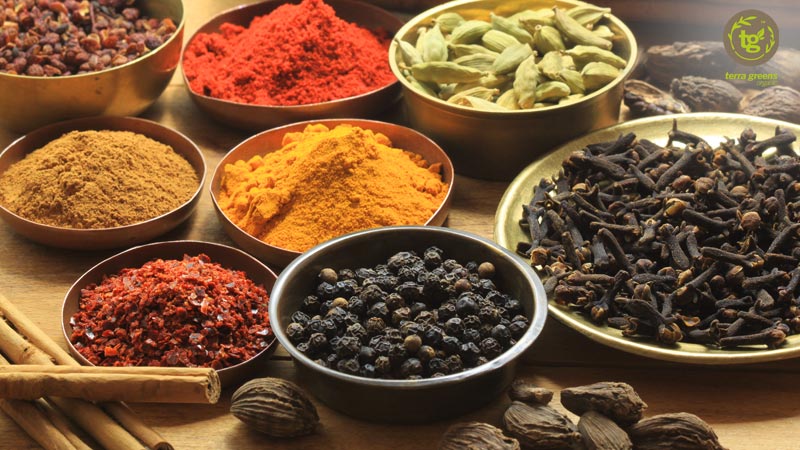Turns out that the humble “masala dabba”, the box which contains various Indian spices, proudly carrying its badge of turmeric and chilli powder stains, is no less a warrior than the medical bag that the family doctor of old carried with him on his home visits. Also turns out that Grandma’s old remedies maybe old but are of relevance and importance in today’s pill popping world.
Let’s just look at a few of the occupants of the masala dabba:
Turmeric: not just vibrant colour
Turmeric powder is made from the boiled and dried rhizome (stem) of the turmeric plant. You cannot imagine Indian dishes without adding at least a little of this deep yellow coloured powder.
I can still remember my grandma adding “haldi”(turmeric) to warm water and making me sip it to ease the colic that was the outcome of eating one too many goodies on Diwali day. Turmeric is good for digestion. This is probably why it found its place in everyday use in Indian and Asian kitchens.
It has long been used by the Chinese to treat depression. Turmeric is a great antibacterial and antiseptic agent and it is 100% natural. Even today a paste made of this spice and water is used to cure cuts and burns. This is also the reason that it is added to face packs and is a good way to deal with acne.
It is a potent anti-inflammatory with none of the side effects that the use of such drugs can cause you. This makes turmeric useful in fighting arthritis and rheumatoid arthritis. Turmeric is a natural way to detoxify your liver.
Research has also indicated that the everyday use of turmeric in Indian kitchens is probably the reason for the low incidence of Alzheimer’s disease in India: less than one fourth of the USA for the people in their 7th decade of life.
Pepper up your life
Black is the “in” colour in your kitchen too. Pepper is the fruit of the black pepper plant and is native to Kerala. It has a tantalizing aroma – never mind the sneezes! The chemical piperine is what gives pepper its spiciness. Black pepper is at its best when ground afresh.
Age old relief from colds and coughs always meant a teaspoon of honey with crushed pepper. Pepper powder added to hot water and eucalyptus makes an effective inhalation for de-congestion when you have a bout of the ‘flu or respiratory discomfort from the increasing levels of pollution and allergies.
It is rich in manganese, iron, potassium, Vitamin C, Vitamin K and dietary fiber. Also, stimulates digestion by stimulating the secretions from the taste buds which “message” the stomach to produce the protein digesting hydrochloric acid.
It is also a great anti-bacterial and this makes it a good food preservative. A pinch of freshly ground black pepper can help in weight loss: the skin of the pepper pod has phytonutrients which increase metabolic rate and fight fat. Hard to believe but a touch of black pepper in your face pack can be a great exfoliator. Black pepper extracts are, in fact, used to fight vitiligo, a skin condition where loss of pigmentation results in white patches.
The goodness of turmeric is enhanced if it is used in combination with black pepper.
A cinnamon stick will do the trick
You‘re barking up the wrong tree if you think cinnamon is just good for its appetizing smell and that dash of pungency in your dish. This inner bark of some species of this tree improves digestion. It also soothes that irritated and tender stomach following a bout of tummy trouble.
Just mix a little cinnamon powder with a tablespoon of curd.
Cinnamon is anti-bacterial and anti-allergic and is, thus, a good preservative. It is also anti- inflammatory. 1 tablespoon of cinnamon contains about 1.4 mg of manganese: this is really helpful in preventing osteoporosis especially in women. Research has also shown that it aids in controlling heart disease and diabetes because of its cinnemaldehyde and cinnamic acid content.
The aroma of this spice makes for a great mood enhancer.No wonder that cinnamon bun is no less upifting than that spicy aftershave!
Cloves: small buds, mammoth benefits
The punch that these little buds carry are what makes them an indispensable ingredient when spice is what is nice. In addition to being a must in exotic oriental cooking, here’s what cloves can do:
Fight oral infections and relieve pain. This is why clove oil is the central theme in many a toothpaste advertisement. This antimicrobial property also makes them great for the immune system. In fact, they as antimicrobials, combat serious disease like Cholera.
Cloves and its extracts are very effective in maintaining heart health by containing LDL cholesterol levels and preventing the formation of blood clots.
The eugenol in cloves is beneficial to the liver: it prevents the formation of a fatty liver and, thus, enhances liver function. It arrests cirrhosis which can be a precursor to cancer.
Clove oil is also EXTREMELY strong and should be used with great care. Better then, don’t you think, to introduce a few buds in your recipes and reap the benefits in the course of a meal?
There’s an old and wise saying: “You are what you eat.”
So when you want to eat well, eat wisely too. Include these common ingredients not just in your kitchen but in your medical kit, to lead a healthier drug-free life. When you cure naturally, you benefit doubly because there are no side effects.

